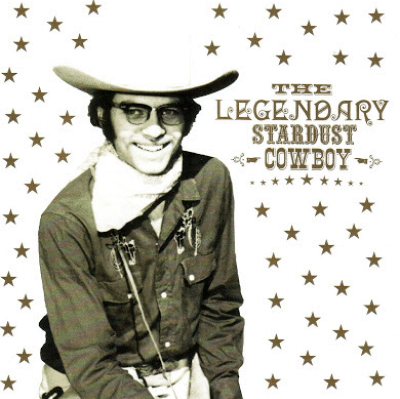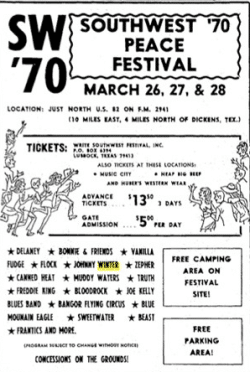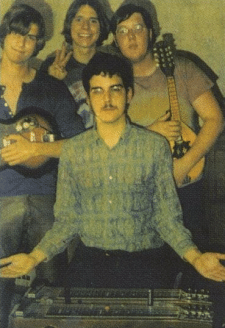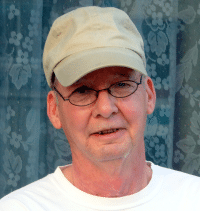.
.
The importance of place and its impact on music – no matter the genre – is a fascinating topic. In this essay, Clay Coppedge writes about his hometown of Lubbock, Texas, and some of the musicians and events that made up that city’s music scene during the mid-late 20th century
.
.
___
.
.

Lubbock, Texas native Norman Carl Odam was known professionally as the “Legendary Stardust Cowboy,” and considered to be a pioneer of the genre known as “psychobilly.”
.
.
Hub City Hip
By Clay Coppedge
.
…..The first time most of the wider world ever heard of Lubbock was after several people saw a group of bright lights zooming across the skies over the city in 1951. Witnesses, including three Texas Tech professors, described the lights as looking like a string of beads moving in a rough semi-circle, their color “a soft glowing bluish green.”
…..An enterprising Texas Tech student snapped off five photos of the lights and took them to the Lubbock Avalanche-Journal. The pictures ran in newspapers all across the country, in Life magazine, and on television newscasts. People from the Air Force came to town and studied the pictures in the kind of detail that only the government can muster and determined that they didn’t know if the photos were authentic or not, but they concluded that the Lubbock Lights were a natural phenomenon.
…..“The Air Force conclusion is that birds, with streetlights reflecting from them, was the probable cause of the sighting,” read a report on the Lubbock Lights that went on to say the Air Force had gathered this information on good authority without identifying the authority. Top secret.
…..Whether or not the weirdo factor of being associated with UFOs had anything to do with it or not, Lubbock, when I was growing up there, became a punchline, a catchphrase aimed at nobodies living in the middle of nowhere. People thought the name of the town just sounded funny.
…..“Played a date in Lubbock the other night. Lubbock. Lub-bock. Sounds like a frog in heat on a wet rock,” comedian Shecky Greene cracked. Yuk, Yuk.
…..My hometown suffered a further bit of infamy in 1968 when the Hub City’s own Legendary Stardust Cowboy (Norman Carl Odam) played a song called “Paralyzed” on the TV show Laugh-In. “Here he is – from Lubbock, Texas – the Legendary Stardust Cowboy!” the hosts cackled.
…..Our hero showed up for his national TV debut wearing a buckskin jacket, cowboy boots with spurs, audacious yellow chaps and a ten-gallon cowboy hat. He looked like Hopalong Cassidy on acid. He banged out a song called “Paralyzed” that consisted of variations on a chord, or possibly a semi-chord, and a lot of screaming.
…..Why, we wondered, did Laugh-In make such a big deal about the Stardust Cowboy’s hometown?
…..Back then, hardly anybody ever mentioned the fact that Buddy Holly drew his first breath and strummed his first chords in Lubbock, or that Elvis played a few gigs there in the 1950s and only got beat up once. (We always heard that some of the local boys roughed him up after he consented to autograph their girlfriends’ bras and panties, and it might have happened just that way. By the time I heard the story the cowboys had also burned Elvis’ pink Cadillac. It’s one of those stories that’s too good to verify.)
…..Most people in Lubbock had no inkling of the impact that Buddy Holly had on American music until nearly two decades later, when Hollywood gave us The Buddy Holly Story and people started coming from all over to see the town where Buddy was born. If the music died in that Iowa cornfield where Holly’s plane crashed, as the song “American Pie” would have it, that same music was born in Lubbock. Fans pilgrimaged to Lubbock the same way they trekked to Liverpool to pay homage to the Beatles.
…..Long-time Lubbock music store and recording studio owner Don Caldwell believed Buddy Holly would have opened his own recording studio in Lubbock if he’d lived, and he further believes that the Beatles would have recorded an album there as a tribute to their hero and mentor. What would the Beatles have made of Lubbock? And what kind of welcome would the Beatles have received in the Hub City?
…..We might get an idea from the 1970 Southwest Peace Festival, the town’s answer to Woodstock. Some well-meaning young Lubbockites took it upon themselves to stage the festival in a big field just outside of Lubbock in March of 1970. They originally chose a pretty slice of canyonlands country about 60 miles east of town near Dickens as the festival site but backed out when local ranchers promised to drop rattlesnakes from airplanes onto the festival goers. People from Dickens have a reputation for doing what they say they will do. The promoters found a new site.

Poster for the 1970 Southwest Peace Festival
…..What the new site lacked in rattlesnakes it made up for in wind, dust, and law enforcement officers. I was a junior in high school and I just had to go, despite (or maybe because of) my dad’s insistence that I keep my ass at home. Festival goers would be “fornicating under their blankets” and shooting heroin, he said. I had no interest in the latter, but the possibility of the former gave my desire to go a new focus. I finally got my way by agreeing that if I ended up in jail all I’d get from the old man would be a hard time.
…..Soon after I got to the festival I wished my dad had showed more resolve. The site was in the middle of a cotton field, and all the cotton fields that surrounded it were plowed and awaiting seed. Spring is the prime time for dust storms on the plains, and the one that blew onto the festival grounds was accompanied by one of the region’s fabled Blue Northers, the notorious blasts of Arctic air that routinely blow across the plains, turning the sky deep blue or purple, freezing spring in its tracks, and sometimes bringing dust as insult to injury.
…..The Lubbock-Avalanche Journal reported that the Department of Public Safety had 357 officers working the site by the festival’s merciful end, including Texas Rangers and undercover narcotics officers. Highway patrol cars lined the highway leading to the site as if it was a parade route to the county jail. The AJ reported that the festival set several records, including most arrests in one day, most felony arrests in one day, most drug violations in one day, and most people in county jail in one day (164). By the end of the three days various law enforcement agencies had made 624 arrests in connection with the festival.
…..As for the music, there wasn’t any. Not that I remember. Most of the bands never left their hotel rooms, or they never made it to Lubbock to begin with. Freddie King, Bloodrock, Bangor Flying Circus, Poco and Canned Heat were all supposed to be there live and on stage but most of them failed to show. A friend of mine worked at the festival – volunteered, actually – and was assigned to pick up Canned Heat at their motel and drive them to the site in his VW van. Bob Hite took in the wide, mostly empty dust-blown streets and asked, “Do people actually live here?” The band worried that the wind might topple its amplifiers or even the band itself. They backed out.
…..I spent a couple of hours at the festival with some my buddies, noting the high number of troopers on horseback but a decided absence of anybody fornicating under the blankets. We left through a maze of state and county law enforcement officers who didn’t have to warn us not to come back.
…..That was the Lubbock the Beatles would have visited if Buddy Holly had lived and if he’d built a recording studio in town and if the Beatles had gone there to record an album. If the locals beat up Elvis, what would they have done to the Beatles?
…..Another story making the rounds in those days told how someone stole Stephen Stills’ prized Les Paul guitar when Buffalo Springfield ventured to Lubbock with the Beach Boys and Strawberry Alarm Clock in 1968. My own fact-checking found that the story is “probably true.” The late guitarist Ed King, who was with the Strawberry Alarm Clock and later Lynyrd Skynyrd, wrote about the incident on his now-defunct website. King didn’t name the town but I’m sure it had to be Lubbock, just as we suspected all along.
…..According to King, Stills got the guitar back and the other musicians and roadies who witnessed the attempted heist stomped the living daylights out of the would-be thieves, who had attempted a bold but stupid grab-and-run operation that came up painfully short.
…..Jimi Hendrix was scheduled to play Lubbock in the fall of 1970, but when he found out he was booked to play Lubbock he killed himself. Or at least that’s what we figured.
*
…..We had no reason to think Lubbock would ever be known for anything other than UFOs, dust storms, cotton fields, and Texas Tech University. We grew up around good music, but I suppose we thought everybody did. We didn’t suspect that people like Joe Ely, Butch Hancock, Jimmie Dale Gilmore and Terry Allen were among the best songwriters in the country, or that the disc jockey on KDAV radio would become Waylon Jennings because he already was. Sonny Curtis, who played with the Crickets and wrote the theme to the Mary Tyler Moore Show was still in town, and so was a young Lloyd Maines, who spent his childhood playing in and around Lubbock with his brothers and was a virtuoso even then. His daughter, Natalie Maines, was the lead singer for the Dixie Chicks. Saxophonist Bobby Keys played with the Rolling Stones, who dubbed him “the ruby-lipped essence of Lubbock, Texas.” There was Delbert McClinton, and the prairie bluegrass sound of the Mayfield Brothers. There was Al Strehli and his daughter, Angela. Good musicians were everywhere and we didn’t wonder why until much later, when the rest of the state started asking what it was about Lubbock that produced so many outstanding musicians and songwriters.

Guy Juke and his band, 1961
…..Lubbock artist and guitarist Guy Juke answered in true Lubbock fashion when Texas Monthly asked him the question. “Alien implantation of fetuses from the Lubbock Lights is my theory,” he explained. “Aliens, in order to enter society, go through the pregnant woman. They send their mind through that. And then Butch Hancock is born.”
…..Maybe I could have been one of those great Lubbock musicians if I’d had any talent or the patience to overcome my lack of talent with practice. An absence of natural rhythm vexed my fallback position, the drums. But by disguising myself as an actual musician I got to know people who qualified for the label. The next best thing to being in a band is hanging out with a band, especially if you don’t have enough talent to be in a band.
…..One thing I discovered from hanging out with a couple of bands was a vast disparity between the Lubbock musicians’ talent and the Lubbock audience’s capacity to appreciate that talent. “Play some Chicago!” our peers would yell at a four-piece band with not a horn amongst them. “’Nights in White Satin’!” “Santana!”
…..I got some insight into the Lubbock dynamic one night when I went with my pal Doak Short and his band to a gig at Hodges Community Center, one of Lubbock’s few “sanctioned” teen hangouts. Doak’s band had been together for only a few weeks and the members were all good enough to all play the same notes but not necessarily at the same time. They had some learning to do. Their equipment fit in the back of a Chevy station wagon. They dressed up in matching outfits because they thought that was the cool thing to do. The only song I remember them playing is “Little Latin Lupe Lu” and I thought they did a pretty good job with it.
…..The other band, the one Doak’s band was competing against for a modest cash prize, hit the stage dressed in fringed buckskin jackets, t-shirts, jeans and whatever else they had in their closets. They had hair to their shoulders and honest-to-God amplifiers too big for the back of a station wagon. The one song of theirs I remember is “Route 66” because it sounded “better than the record,” which is how we rated live performances in those days.
…..The way the Battle of the Bands worked was each band played a few numbers and then the emcee asked the audience to cheer for each of the bands. The band with the biggest cheer won the money. Since the audience consisted mostly of our friends and peers, Doak’s band won by several decibels of hoots, hollers, whistles, and applause. A couple of loyal doofuses even booed the other band.
…..Loading the equipment into the back of the station wagon afterwards, we couldn’t help but notice that other band loading its equipment into a van at the other end of the building. “Gotta talk to them,” Doak muttered. He approached their lead singer and guitarist to apologize for winning the contest.
…..“Just want to let you know that we know we suck and you guys are great, okay? It’s not like we’re going to brag about this or anything.”
…..Joe Ely slapped Doak on the shoulder and laughed. “Don’t worry about it, man. It happens all the time.” We felt better because we had no doubt that his reassurance was the truth. Our peeps would have probably booed the Beatles had they showed up at the community center for a live version of “Get Back.”
…..Speaking strictly for myself, I’m glad the Beatles never made it to Lubbock. Ringo is the only one who would have had a chance.
.
.
___
.
.

Clay Coppedge has worked for newspapers in Central Texas as a sportswriter, feature writer, columnist, and reporter. His work has appeared in a wide range of magazines, including Acres USA, Austin Sun,A ustin Chronicle, Big Bend Literary Magazine, Elysian Fields Quarterly, Field & Stream and others. He’s also written five books of Texana for History Press and Loaded South: A Taxi Memoir. He lives and works just outside of Walburg, Texas.
.
.
Watch the 1968 performance of Lubbock, Texas native Norman Carl Odam (a.ka.; “The Legendary Stardust Cowboy”) playing “Paralyzed” on Rowan and Martin’s Laugh-In
.
.
Click here to read the Texas Monthly‘s 2000 history on Lubbock’s music scene
Click here to read Clay Coppedge’s short story “Oldies” (which is set in Lubbock)
.
.
___
.
.
Click here to learn how to submit your work
Click here to subscribe to the Jerry Jazz Musician quarterly newsletter
Click here to help support the continuing publication of Jerry Jazz Musician (thank you!)
.
.
.
.
































